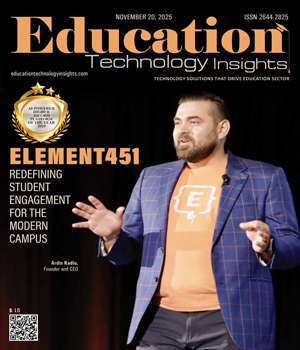THANK YOU FOR SUBSCRIBING
Be first to read the latest tech news, Industry Leader's Insights, and CIO interviews of medium and large enterprises exclusively from Education Technology Insights
Digital ecosystem for education in Europe from a HEI perspective: It's all about people
Christa Winqvist, Chief Information Officer at Aalto University
Dr. Claude Toland Christa Winqvist, Chief Information Officer at Aalto University
Christa Winqvist, Chief Information Officer at Aalto University
The outcomes of this disruption, that the pandemic induced, have already affected Higher Education Institutions (HEIs) over Europe, accelerating collaboration and cooperation around the creation of a European digital ecosystem that reflects European public values. This ecosystem will support the aim of online and virtual education to be possible and to be provided in a high-quality manner. Furthermore, European HEIs cannot compete with tuitions (US) and cheap labour (Asia). We have to build our own competitive advantage by doing things technically savvy, commit to same standards and data flow and build a European platform on top of which we can achieve something with a “wow effect”, instead of repeating the same mundane systems and services over and over again.
One of the main problems is, that the previous work has been very sporadic, done by several parties and thus created disconnected frameworks, various suggestions for standards, poor data quality and lack of interoperability. Many of these entities are still working unknowingly of each other, building up unintentional siloes, and thus clouding the common goal of a holistic European ecosystem for education. In order to succeed, the work needs to be coordinated and facilitated accordingly. For facilitating this work EU has, during the preparation of the Digital Education Action Plan (2021-2027), established The European Digital Education Hub (EDEH), where the European Commission is building a community of stakeholders working on digital education. The aim is to support people in finding each other and exchanging ideas.
"The genesis of a digital ecosystem for education requires diverse collaboration across the fields; including things like uniform processes, common vocabularies, and conceptual frameworks, and most of all, trust between people living in it"
In addition to European Commission level actions, also informal networks and coalitions are needed, as long as they comply to and contribute to the standards coordinated by the European Commission. One of these valuable networks is EUNIS (European University Information Systems organization). The mission of EUNIS is to help member institutions develop their IT landscape by sharing experiences and working together. EUNIS brings together people from different sectors and backgrounds for better common understanding. If your HEI is not already a member of EUNIS, I strongly recommend that you consider joining.
An ecosystem cannot be created merely by a single line of business though, nor from a digital technology perspective. Quite often an ecosystem is not even created, but it rather builds up by its own. The genesis of a digital ecosystem for education requires diverse collaboration across the fields, including things like uniform processes, common vocabularies and conceptual frameworks, and most of all trust between people living in it. We all know that it is quite easy to agree, that something needs to be changed, until one has to change his/her own way of doing or thinking. This is where trust comes in: by trusting that we all have the same goal, and that everyone is doing their utmost best, we create a psychologically safe platform for an ecosystem to be born, grow and flourish. Trust enables honest discussion where everyone feels safe to speak up. Only by combining different perspectives and sets of expertise, new great ideas and innovations will be born. In the end, it’s all about people. So, people – let’s start trusting each other even more and show once again, how unified we really can be!
Read Also
The Power of International Education Collaborations
Designing Schools around Student Voice
What is Edtech Leadership in 2026
Designing Academic Leadership Around Real Lives
Why Student Success Begins with Being Seen
Inclusion is not a Department: The Systemic Ripple Effect of Belonging

I agree We use cookies on this website to enhance your user experience. By clicking any link on this page you are giving your consent for us to set cookies. More info






















